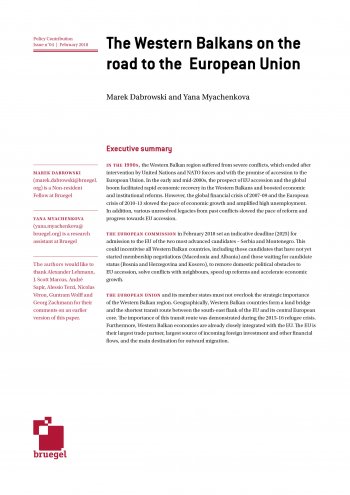Policy Contribution
The Western Balkans on the road to the European Union
Given its geographical location, the region is important to the EU in terms of security, stability, trade and transit routes. The Western Balkan countries’ economic and political prospects and their future within a European framework should remain one of the top priorities for the EU.
In the 1990s, the Western Balkan region suffered from severe conflicts, which ended after intervention by United Nations and NATO forces and with the promise of accession to the European Union. In the early and mid-2000s, the prospect of EU accession and the global boom facilitated rapid economic recovery in the Western Balkans and boosted economic and institutional reforms. However, the global financial crisis of 2007-09 and the European crisis of 2010-13 slowed the pace of economic growth and amplified high unemployment. In addition, various unresolved legacies from past conflicts slowed the pace of reform and progress towards EU accession.
The European Commission in February 2018 set an indicative deadline (2025) for admission to the EU of the two most advanced candidates – Serbia and Montenegro. This could incentivise all Western Balkan countries, including those candidates that have not yet started membership negotiations (Macedonia and Albania) and those waiting for candidate status (Bosnia and Herzegovina and Kosovo), to remove domestic political obstacles to EU accession, solve conflicts with neighbours, speed up reforms and accelerate economic growth.
The European Union and its member states must not overlook the strategic importance of the Western Balkan region. Geographically, Western Balkan countries form a land bridge and the shortest transit route between the south-east flank of the EU and its central European core. The importance of this transit route was demonstrated during the 2015-16 refugee crisis. Furthermore, Western Balkan economies are already closely integrated with the EU. The EU is their largest trade partner, largest source of incoming foreign investment and other financial flows, and the main destination for outward migration.

















